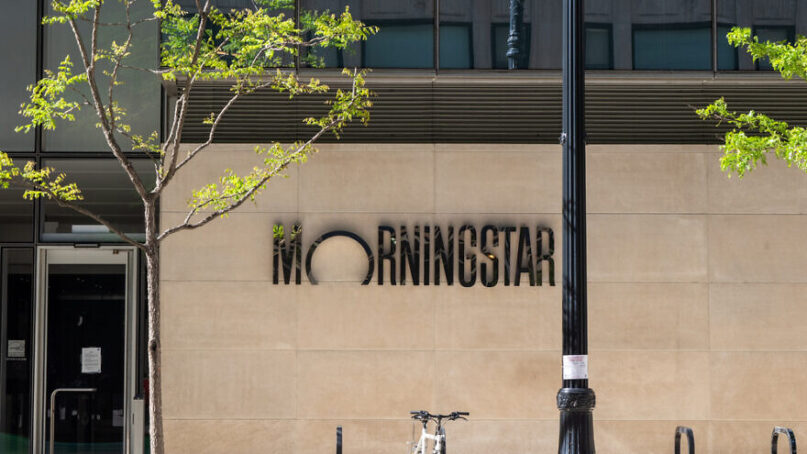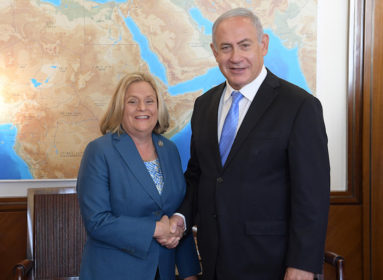
By Mike Wagenheim
(JNS) Nearly two months have passed since U.S. investment firm Morningstar reached an agreement with pro-Israel organizations to alter its methodology in assigning risk ratings to companies doing business in and with Israel.
Yet none of the ratings have changed, even as Morningstar and a leading American Jewish interlocutor say the company is working towards its stated pledges, including the hiring of an independent expert to advise Morningstar on its assumptions and processes.
Even so, some are not convinced Morningstar is serious about changing its ways after coming under fire for its risk ratings methodology and the inherently biased sources it uses when dealing with the Israeli-Palestinian issue.
“The same process just gets reinvented every few months with no changes made. They had pressure, so they hired [independent law firm] White & Case and came back with a few tweaks. They thought it would pacify people. No one was fooled by it,” Rich Goldberg, senior adviser at the Foundation for Defense of Democracies and Morningstar critic, told JNS.
“They went into a multi-month engagement with leading Jewish experts, leading foreign policy experts, BDS experts, ESG [environmental, social and governance movement] experts. And they came out of that process with a series of commitments, with no changes made. Now they’re digging in to have an independent consultant,” he said.
Goldberg questioned how much effort it takes “to say these few dozen Israeli companies will no longer have ‘controversy’ ratings attached to them related to this issue. That doesn’t seem like it’s that hard.”
Morningstar told JNS, “We are in the process of implementing the recommendations from the third-party report as well as the additional commitments made October 31, 2022. All controversies have now been reviewed, and we will complete the process of removing any references to divestment and agreed sources before the end of the year.”
Morningstar is under investigation by at least 19 U.S. states for its practices, including potential violations of state BDS laws. Morningstar and its subsidiary Sustainalytics have been accused by critics of utilizing anti-Israel sources and weighing them disproportionately in assigning Environmental, Social and Governance (ESG) risk ratings to companies as guidance for socially-minded investors. The ratings, which assigned a higher risk simply for doing business in or with Israel or in Israel-controlled territories, amount to a de facto boycott of Israel, allege several American Jewish groups and state officials.
SUBHEAD: Biased and unreliable sources
Morningstar reached an agreement with a host of American Jewish and pro-Israel organizations in late October. Among the company’s pledges, Morningstar committed to barring the use of biased and unreliable sources from its reporting, such as the United Nations Human Rights Council and the Who Profits organization.
The firm said it will use geographic names (e.g. West Bank, East Jerusalem) in relevant regions, rather than terms such as “Occupied Palestinian Territory” or “occupied territory”; provide guidance to analysts that will ensure businesses operating in Israeli-Palestinian conflict areas or contributing to Israel’s defense against terrorism are not treated as de facto violators of human rights; remove references to the BDS campaign; provide ongoing anti-bias and antisemitism training to relevant staff; bring in independent experts to ensure ESG ratings do not single out and discriminate against Israel or hold it to a different standard than other countries; and review and update existing data and analysis to align with the commitments described above.
Notably, there were no hard deadlines put in place.
“That was one of my chief criticisms of it and why I didn’t support it,” said Goldberg, who authored a comprehensive memo on the topic. “It was presented as a case of if they’re trying to do the right thing, sell their anti-Israel employees that they’re just trying to do it by the book and objectively, and lay out and implement a series of principles, then that will lead them to ratings changes. That’s the self-delusion that I think some groups engaged in.”
Several high-profile American Jewish and pro-Israel organizations declined to sign on to the agreement, signaling their displeasure with potential loopholes and other shortcomings in the language of the document.
The Jewish Federations of North America, which issued the October announcement at its annual General Assembly, is running point on the ongoing discussions with Morningstar, which said, “We remain in consultation with the Jewish Federations of North America about retaining an independent, recognized expert in international law to advise on assumptions, sources and use of language related to the Israeli-Palestinian conflict in Sustainalytics’ research and products. We intend to fulfill all commitments in a timely manner, no later than June 2023.”
A source with knowledge of the ongoing discussions told JNS that “we want to make sure that those commitments are carried out, not just to the language, but to the spirit of the commitments. So that’s what we’re working on.”
SUBHEAD: Working in tandem
Elana Broitman, JFNA senior vice president for public affairs, told JNS, “In working to ensure that Morningstar lives up to its commitments, Jewish Federations of North America are working in tandem with a broad coalition of partners that have collaborated together since July to urge the company to make changes to address its anti-Israel bias.”
Broitman pointed to a July letter to Morningstar executives urging them to implement a number of steps.
“Both the hiring of ‘well-versed’ and ‘recognized’ experts described in commitment #5 and the implementation of training described in commitment #4 are among these fundamental measures we expect Morningstar to take to fully carry out its commitments and ensure that anti-Israel bias ends,” the letter read in part.
The source said the focus is on implementing the changes correctly, rather than in a rushed manner, especially approaching a holiday break when many staffers are inaccessible.
The lack of visible progress thus far is “not necessarily nefarious,” said the source, adding that Morningstar is in the process of reviewing voluminous records in order to scrub them of references to information gleaned from U.N. Human Rights Council sources, then review its data to see how it shifts as a result, and how it affected past reports.
According to that source, Morningstar is removing information in its reports where there was an Israel divestment “or even something as flimsy as a student vote on a divestment,” and removing language regarding “occupied territory.”
A second source indicates that Morningstar is in the process of speaking with candidates who could assist with its anti-bias training.
But Goldberg said that whether and when any independent advisory group is brought on is secondary to Morningstar’s view of the issue as a whole.
“The point is to ensure Morningstar didn’t backslide on its commitments, that it doesn’t reattach controversies based on new sources that they developed, that the process was fundamentally changed,” he said. “The concept of that is fine, so long as the intention of the organization is pure. If the intention of the organization is to maintain its support for BDS but just try like crazy to get [U.S.] states off their backs, then it’s a useless exercise.”
MAIN PHOTO: The Morningstar financial services building in downtown Chicago. Credit: Adriana.Macias/Shutterstock.








 Southern New England Jewish Ledger
Southern New England Jewish Ledger














